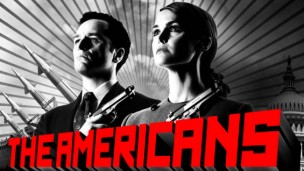Keri Russell and Matthew Rhys play the KGB next door in FX's The Americans.
It is the 1980s in Washington, D. C. Elizabeth (Keri Russell) and Phillip (Matthew Rhys) Jennings live an enjoyable suburban life as they do their best to preserve their marriage and raise their two children. Oh, and they’re also KGB agents bent on winning the Cold War within American borders.
“The Americans,” which just began its third season on FX, is some of the best television airing at the moment. With its mix of KGB operatives, FBI agents, and all the civilians caught in the crossfire, the show walks a much more morally gray line than most. We consistently root for the Jennings, if not always for their overseers. But make no mistake: While “The Americans” is one of the best spy shows out there, espionage is its plot, not its focus. This is a show about intimacy. The Jennings’ marriage is examined from every angle as both members actively seduce (and even marry) others to gain information. As the show progresses, it becomes increasingly difficult to pinpoint which relationships are “fake” and which are “real.”
“The Americans” makes this work with its nebulous web of an ensemble. Stan Beeman (Noah Emmerich), for instance, is a top FBI agent fighting communism on the home front while living next to the Jennings, but he enters into an extramarital relationship with a Russian diplomat who may or may not be a double agent. Beeman, like most of the characters, interacts with many of the show’s plotlines but is not fully aware of his place among them. Claudia (Margo Martindale) is a KGB handler who never quite gets on the Jennings’ good side. Martindale always manages to be impossible to read while constantly maintaining a balance of sass and genuine threat that is deeply enjoyable to watch. More prominently, Paige Jennings (Holly Taylor) rebels against her parents and society during her adolescence while being completely unaware that the show is slowly pulling her deeper into the fold of the Cold War.
Paige’s character denotes an important shift in the show. While marriage continues to remain an important aspect in several plotlines, “The Americans” has also become more concerned with parenthood. The Jennings household is of questionable stability, and while Paige and Henry (Keidrich Sellati) have grown up unaware of their parents’ night-lives, their childhood is by no means normal. Keeping the family intact (and alive) is a task that Elizabeth and Phillip find harder and harder to accomplish.
Ultimately, Russell and Rhys make the show truly work. Their chemistry and ability to portray Soviet spies as human are absolutely essential for “The Americans” to be successful. We see their flaws and their desperation for survival. Phillip warmed up to the luxuries of American capitalism after years on enemy soil, while Elizabeth would still die for her homeland. As both actors rotate through a parade of wigs and disguises during operations, Russell and Rhys perform several roles within roles admirably.
Composer Nathan Barr also deserves praise. He can ensure that any espionage sequence is filled with intense tension and suspense, but he prefers to work more quietly. Barr can make a scene incredibly ominous just by hauntingly playing the main theme on a piano one note at a time.
The third season just premiered, and this one certainly opens with a bang. Between the aftermath of the second season’s revelations and the third season’s new developments, the first ten minutes revel in their tension. The rest of the episode then passes from scene to scene, more quietly setting up events to come. The premiere, as Gabriel (Frank Langella) says straight-out during the episode, is “laying the groundwork” as the Cold War becomes ever more threatening on several levels.
As I’ve watched “The Americans,” I’ve found it surprisingly comparable to “Mad Men.” Both shows examine the culture of a decade through industry. While the world of ’80s espionage may seem more exciting than the world of ’60s marketing, both shows do their jobs impeccably. Perhaps even more than “Mad Men” does, “The Americans” portrays a sexist environment through its diverse female ensemble. While “The Americans” gets away with more than a few sex sequences of questionable necessity, both shows find the nuances in intimate relationships. Here, the exchanges in the bedroom are just as important as the drama in whatever constitutes for the workplace. “The Americans” can, I hope, fill the hole that “Mad Men” will leave behind when it concludes in the next few months.
In the meantime, the third season of “The Americans” is shaping up to be an exciting addition to a show that continues to prove itself. Its vibrant contribution to the spy genre deserves far more viewership for its thrilling Cold War story, horrifying sexual roleplays, and everything in between.

Comments are closed